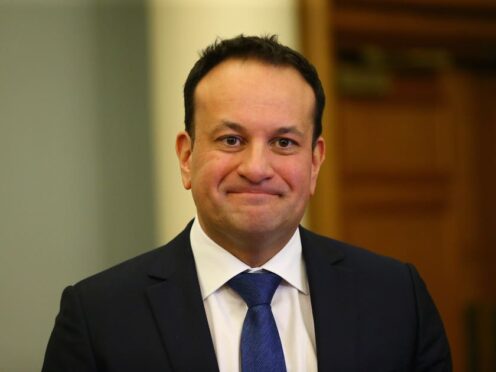Ireland has voted to reject the Government’s proposal to change the constitution on family, with 67% of people voting against the amendment.
The referendum returning officer Barry Ryan made the official declaration at Dublin Castle just before 7pm.
Turnout for the referenda was 44.36%, a significant drop from the abortion referendum in 2018 which saw a turnout of 64%.
The declaration on the care referendum is expected on Saturday evening.
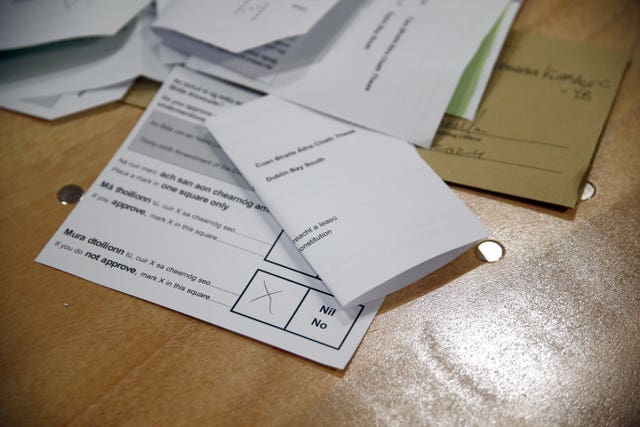
Earlier, the Irish premier said it was clear that the referenda to change the Constitution in Ireland has been “defeated comprehensively”.
Leo Varadkar said the electorate has given the Government “two wallops” as the final counts of the two Constitution referenda continued with defeat looking likely in each.
Tallies show there was a significant no vote in both questions, with some constituencies polling particularly high against the Government’s referenda.
The boxes were opened at 9am after the public went to the polls on Friday to vote on whether to change the wording of the Constitution relating to the areas of family and care.
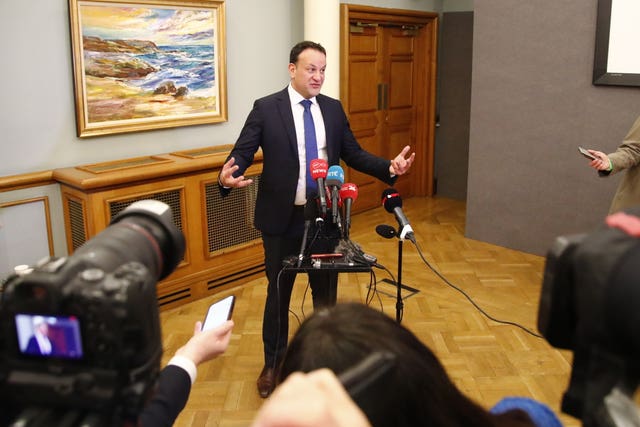
Early tallies showed a strong support for no votes, signalling an embarrassing defeat for the Government.
Speaking at Dublin Castle, Mr Varadkar said: “I think it’s clear at this stage that the family amendment and the care amendment referendums have been defeated, defeated comprehensively on a respectable turnout.
“The Government accepts the results and will respect it fully.
“As head of Government, on behalf of the Government, we accept responsibility for the results.
“It was our responsibility to convince a majority of people to vote yes and we clearly failed to do so.
“I think we struggle to convince people of the necessity or need for the referendum at all, let alone detail on the wording.
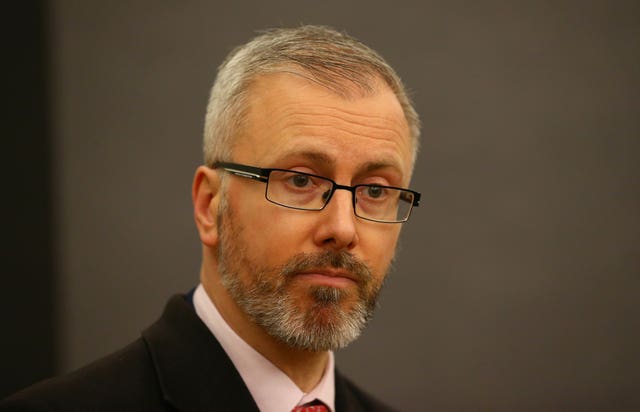
“That’s obviously something we’re going to have to reflect on into the weeks ahead.
“What I do want to say to people, though, is that when it comes to the work of Government, in relation to gender equality, in relation to improving conditions for carers, in relation to giving rights for people with disabilities, that work will continue.”
Mr Varadkar also admitted the Irish Government “clearly got it wrong”.
“I think Enda Kenny (former taoiseach) famously said once that the electorate often gives the Government a wallop – this is two wallops,” he added.
“Well, look, clearly we got it wrong.”
Children’s Minister Roderic O’Gorman said the Government was not successful in convincing the public of its arguments to change the Constitution.
“The Government has to make the case, and it’s clear that throughout this campaign issues were raised, issues that I think were incorrect interpretations that I and Government believe were incorrect,” Mr O’Gorman said.
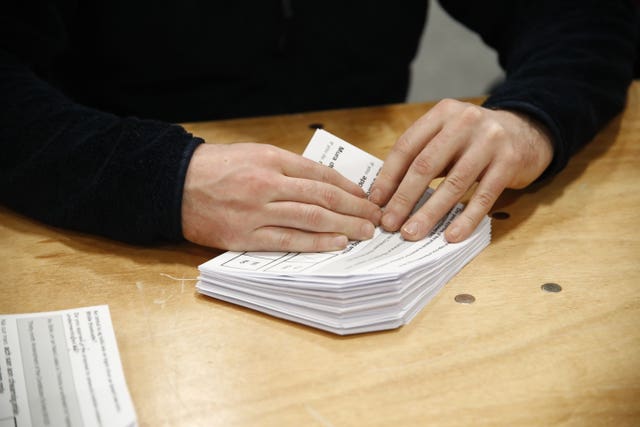
“But we weren’t successful in convincing people that our arguments were strong.
“I think it has to be acknowledged that the departure from the wording of the Citizens’ Assembly meant that some of those NGOs and civil society organisations, who would have been supportive originally, didn’t feel they could support and (didn’t) feel they could campaign to the same degree.
“I think that was certainly an element.
“Finally, I think the people didn’t see the urgency of the change here in terms of the repeal campaign, where there was a clear outcome the day after the yes vote and in the case of marriage equality, where there was a clear outcome the day of the vote.
“People didn’t get that sense of the need for change here. I think that was a another factor.”
The result of the referendums on family and care is clear.
The majority were not persuaded by the arguments for changing the Constitution in this way.
It is a core strength of our Constitution that the people have the final say. We fully respect their decision. (1/3)
— Micheál Martin (@MichealMartinTD) March 9, 2024
Irish deputy premier Micheal Martin said the majority of the public were not persuaded by the arguments for changing the Constitution.
“The result of the referendums on family and care is clear,” Mr Martin said in a statement.
“The majority were not persuaded by the arguments for changing the Constitution in this way.
“It is a core strength of our Constitution that the people have the final say. We fully respect their decision.
“There is no single reason why these proposals were rejected and, like all who supported them, we will reflect on this over time.”
Irish Transport Minister Eamon Ryan conceded early in the count that the Government lost.
“It’s clear we lost,” Mr Ryan said.
When it was put to the Green Minister that the Government did not get the result it wanted, he said: “No, we didn’t.
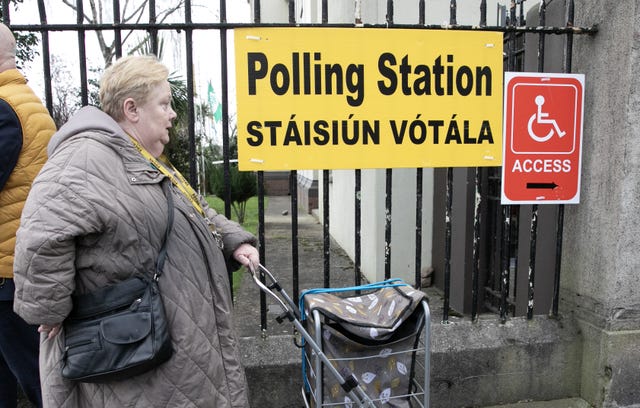
There was a low turnout reported throughout the day, with less than 30% in some areas.
There was a slight uplift at polling stations as people made their home on Friday evening. However it is thought that numbers remained lower compared to previous referenda.
Sinn Fein leader Mary Lou McDonald said her party is “very much” in touch with the Irish public, despite tallies showing the two referenda will be defeated.
Her party advocated for a “yes-yes” vote in Ireland’s ballot on family and care.
“No, we’re very, very much in touch with people, and you’ll recall that I said from the get-go, that we were very much in favour of removing sexist language from the Constitution, very much in favour of an inclusive definition of families,” Ms McDonald said on Saturday.
“But we knew that the Government did come up short in terms of the caring wording. They disregarded the Citizens’ Assembly, they didn’t consult with opposition or with other stakeholders. They didn’t collaborate, and they failed to convince.
“I know, talking to lots of people, that people were left with an unbalanced decision to make and I think it’s a great pity that the Government went on this kind of solo run, and they’ve had their answer.
“I don’t think there has been a lack of clarity for people, I think people when they came out and voted were very clear how they were voting and why they were voting in a particular way.
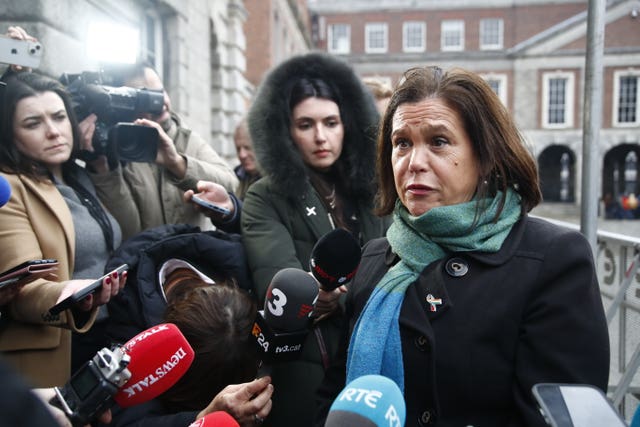
“If there is one big takeaway message from this, it is that support for people with disabilities as full and equals citizens and support for carers is something that has to be taken seriously by Government.
“I think it’ll fall to the next government to vindicate those rights.”
Ms McDonald said Sinn Fein will “return to” consideration the “sexist language” in Ireland’s Constitution if the party is in the next government.
Senator Michael McDowell, a former tanaiste and ex-justice minister, who campaigned for a no-no vote, said the move had represented “unwise social experimentation” with the Constitution.
Mr McDowell, who was part of the Lawyers For No group, said: “I trust individual voters.
“They looked at what was being put before them and they said no.
“Many of them will have a slightly different perspective as to why they were voting no, but in the end we live in a republic and the sovereign power is the people and every individual vote is as good as anybody else’s vote, and this is an emphatic repudiation of what I think was unwise social experimentation with the Constitution.”
Labour leader Ivana Bacik said: “The result at this early stage certainly looks disappointing for those who campaigned for a yes-yes vote.
“I do think and it is clear that it is the Government’s responsibility, because the Government needs to explain to the people first why it chose and proceeded with wording that was so distinctly different from the wording that our Oireachtas committee on gender equality has proposed, wording that cross-parties had supported.
“Why did they not go out more assertively and sell it to the people? Because what we saw from Government, particularly in the last few weeks as the no side was gaining ground, we saw a lacklustre campaign from Government.”
The family amendment proposed extending the meaning of family beyond one defined by marriage and to include those based on “durable” relationships.
The care amendment proposes deleting references to a woman’s roles and duties in the home, and replacing it with a new article that acknowledges family carers.
